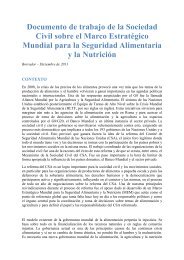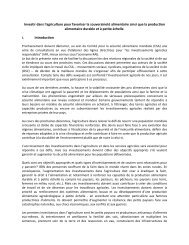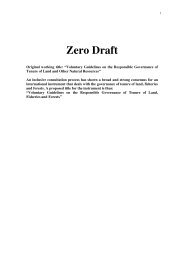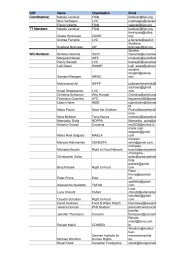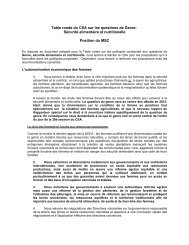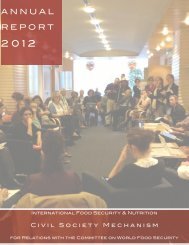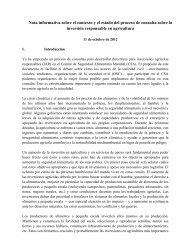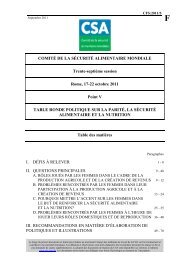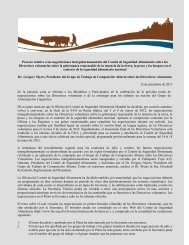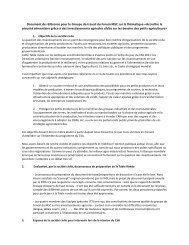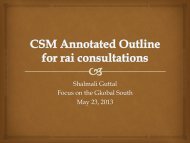The Reformed Committee on Food Security. A briefing paper for ...
The Reformed Committee on Food Security. A briefing paper for ...
The Reformed Committee on Food Security. A briefing paper for ...
Create successful ePaper yourself
Turn your PDF publications into a flip-book with our unique Google optimized e-Paper software.
Inclusivity Realising the inclusivity of the re<strong>for</strong>m document is going to require a major shift inthe way that both member states and perhaps UN officials are used to operating. Sharing space with“those most affected by food security”, finding modes of communicati<strong>on</strong> which enable their participati<strong>on</strong>;creating methodologies and processes <strong>for</strong> weighing the multiple inputs that the CFS is goingto receive – this is going to require both special ef<strong>for</strong>t and good will. Moreover, whilst private sectorparticipati<strong>on</strong> has been underwhelming up until now, if the CFS starts to acquire political authoritythere is a danger – and very real prospect - that they will seek to deploy their c<strong>on</strong>siderable resourcesto try and influence it work. <str<strong>on</strong>g>The</str<strong>on</strong>g> same could be said also of member states that fear that their commercialinterests are being threatened by CFS interventi<strong>on</strong>s. What impact might this have up<strong>on</strong> civilsociety participati<strong>on</strong>?Political relevance <str<strong>on</strong>g>The</str<strong>on</strong>g> CFS seeks to be “the central United Nati<strong>on</strong>s political plat<strong>for</strong>m dealingwith food security and nutriti<strong>on</strong>” (CFS: 2009/2: Paragraph 2). <str<strong>on</strong>g>The</str<strong>on</strong>g> idea of centrality impliesestablishing a relati<strong>on</strong>ship between the CFS and the other parts of the UN system of relevance <strong>for</strong>food security in which the latter are politically subordinate to the <strong>for</strong>mer. <str<strong>on</strong>g>The</str<strong>on</strong>g> obstacles to this arepotentially quite c<strong>on</strong>siderable. <str<strong>on</strong>g>The</str<strong>on</strong>g>se would include, generally speaking:• A high degree of fragmentati<strong>on</strong> across the different parts (different entities with diffe-rent mandates) of the UN system of relevance <strong>for</strong> food security (including weak coordinati<strong>on</strong>links between them);• State incoherence at the global level in different <strong>for</strong>a of relevance to food security, (differentministries pursue different objectives) related to;• State internal incoherence within Capitals (countries rarely have inter-ministerial foodsecurity coordinati<strong>on</strong>, and where this is attempted it has proven quite difficult).Another important challenge related to establishing the political relevance of the renewed CFS emergesfrom the new roles that have been assigned to it. <str<strong>on</strong>g>The</str<strong>on</strong>g>se new roles imply the trans<strong>for</strong>mati<strong>on</strong> of theCFS from a fairly dead space in which Ministers make (unrelated) declarati<strong>on</strong>s (the old CFS), to <strong>on</strong>ein which a serious engagement with policy is required (the renewed CFS). Ministers carry politicalauthority, but they lack the time to sustain a serious engagement with policy. <str<strong>on</strong>g>The</str<strong>on</strong>g>re seems to be a tensi<strong>on</strong>,there<strong>for</strong>e, between these two ambiti<strong>on</strong>s of the CFS’s roles, and preparati<strong>on</strong>s <strong>for</strong> the 2010 Plenarysuggested that this was the case.31



